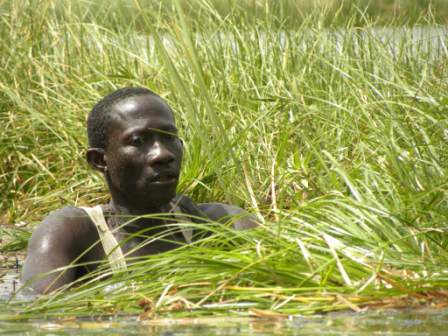Five Mobile Compact Labs to Detect Counterfeit Medicines Presented to Zambia
LUSAKA, Zambia, February 29, 2012/ — To help improve health care in Zambia, the Global Pharma Health Fund, a charitable initiative funded by the German pharmaceutical, chemical and life science company Merck (http://www.merckgroup.com), has donated five mobile compact laboratories to the Health Ministry in the capital city of Lusaka to help detect counterfeit medicines. The so-called Minilabs can be used to identify inferior and counterfeit medicines rapidly and reliably. In this context, Dr. Karl-Ludwig Kley, Chairman of the Merck Executive Board, met with the Minister of Health of Zambia, Honorable Dr. Joseph Kasonde today in Lusaka.
• Global Pharma Health Fund, a charitable initiative funded by the German pharmaceutical, chemical and life science company Merck, donates unique Minilabs to Zambian Health Ministry
• Dr. Karl-Ludwig Kley, Chairman of the Merck Executive Board, meets with Minister of Health, Honorable Dr. Joseph Kasonde
Kley’s visit to Zambia was the third stop on a trip to Africa that included visits to Tanzania and Zanzibar. He learned first-hand about the progress being made in combating the tropical disease schistosomiasis. Merck has committed itself to eliminating the parasitic worm disease in Africa in cooperation with the World Health Organization (WHO).
“Counterfeit medicines are a serious threat to health care. With the Minilabs, we are directly protecting people from what can be a deadly risk,” Kley told journalists. “In addition, we are helping to improve the structures for drug monitoring and ensuring that scarce resources are not wasted on worthless, and even hazardous, medicines.” Kley added: “The mobile compact laboratories are globally unique for their ability to detect counterfeits quickly, cost-efficiently and reliably. With them, one can relieve bottlenecks in quality control for medicines, especially in rural areas.”
The International Police Organization Interpol estimates that up to 30% of all medicines in Africa are either counterfeit or of inferior quality. The Global Pharma Health Fund provides help in this context. The Minilab developed by GPHF consists of two portable and tropic-resistant suitcases that contain the means to detect inferior or ineffective medicines. It offers quick, simple and low-cost test methods to check medicines for external abnormalities, identity and content, and identifies 57 active pharmaceutical ingredients, particularly those in medicines commonly used against infectious diseases. The test methods include those for common antibiotics, anthelmintics, virustatics, anti-malarial medicines, tuberculostatics, and other medicines.
To date, the GPHF has supplied about 470 Minilabs at cost, to more than 80 countries. More than half of these countries are located in Africa, and one-third are in Asia. The combination of a simple, reliable test set for onsite testing and a manual with detailed instructions on performing the test is unique. Merck continues to participate in external research with the aim of increasing the number of medicines that can be tested as well as to discover other possibilities for optimizing the Minilab. Training is also offered to ensure that the users are familiar with the test procedure.
Merck aims to eliminate schistosomiasis in cooperation with WHO
In addition to the Minilabs, Merck is involved in another major project that aims to improve health care on the African continent. Together with WHO, Merck is combating the parasitic worm disease schistosomiasis in African schoolchildren. Merck recently committed to maintaining its efforts in Africa, in cooperation with WHO, until schistosomiasis is eliminated. To date, Merck has provided WHO annually with up to 25 million tablets containing the active ingredient praziquantel, free of charge. In the medium term, the company will increase that number tenfold to 250 million per year. The therapy is considered the most effective treatment in the fight against the parasitic worm disease. The sharp increase in the number of tablets to 250 million will enable the treatment of around 100 million children per year. It is estimated that more than 200 million people are infected and that around 200,000 die from schistosomiasis each year.
Distributed by the African Press Organization on behalf of Merck.
Stay with Sierra Express Media, for your trusted place in news!
© 2012, https:. All rights reserved.





